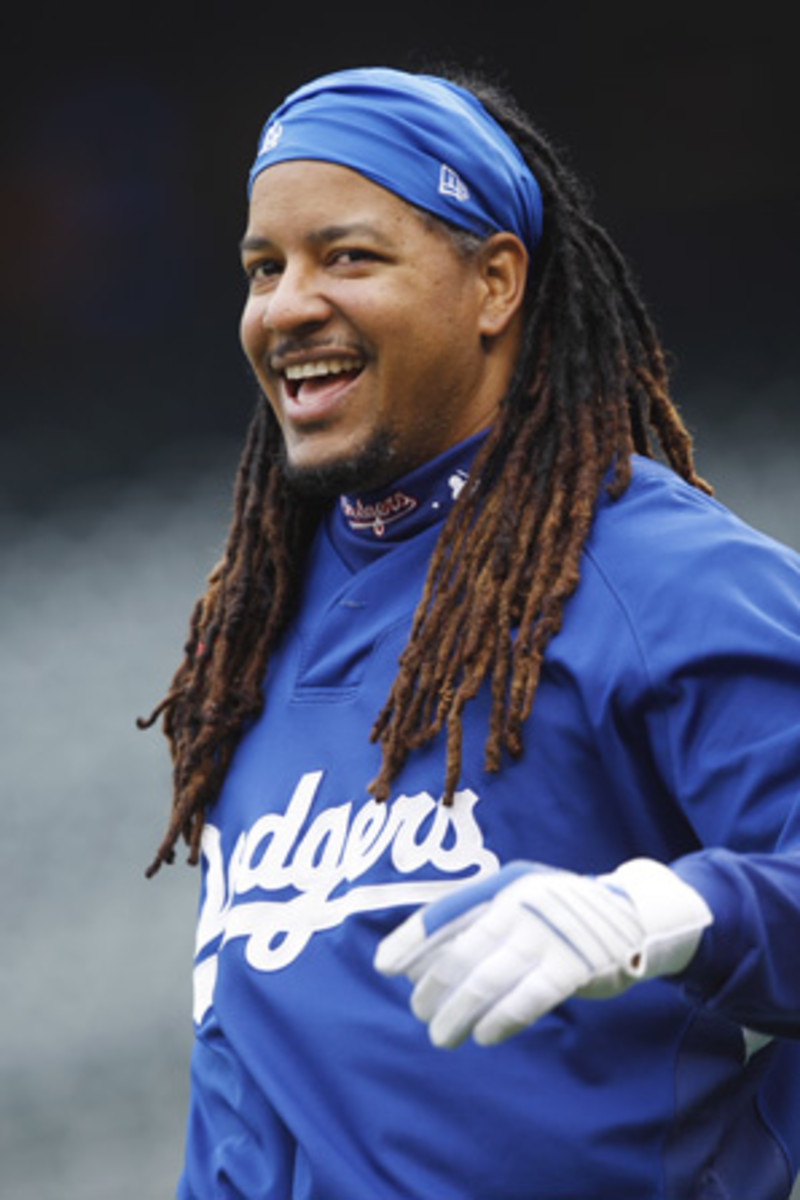
Manny being Manny takes on new meaning with drug violation
One of the last funny, happy stories in baseball is over. That previously mostly warm story died a very sad death on Thursday when Major League Baseball announced that Manny Ramirez had failed a test for a performance-enhancing drug.
Manny has had his problems -- he once pushed down a sixtysomething traveling secretary -- but his public image still was mostly of a pleasant and fun guy. At least it was outside of Boston, where a lot of Red Sox fans were probably celebrating this sorry news. But the whole tale of Manny as a happy goofball is over today.
Manny grew up poor in the upper Manhattan neighborhood of Washington Heights, and I remember going to George Washington High School a couple years after he was drafted No. 13 overall by the Cleveland Indians, and I remember how proud they all were of him.
But "Manny being Manny" has taken on a whole new meaning. Fun antics or not, Manny is a drug cheat, just like the others.
The story of how Ramirez had a problem in the bedroom and had to take a different kind of performance-enhancer was being told by folks sympathetic to Manny yesterday. But the drug that was found in his system is also a performance enhancer on the field. And there can be no disputing that.
Ramirez tested positive for human chorionic gonadotropin, or HCG, which is typically taken by women as a fertility drug and by bodybuilders coming off a steroid cycle. HCG can also help players hit the ball farther, and may make them stronger and give them a feeling of invincibility. It raises a player's confidence level, whether it's taken in the bedroom or on the ball field.
Those sympathetic to Manny claimed he obtained the drug from some quack in Miami. It's quite possible he saw a quack in Miami. As a Miami resident, I can tell from personal experience that the city is full of them. But this is on Manny, not the alleged quack.
Manny is no dummy, no matter what roles he plays on TV or on the field. Manny had to have known better. Everyone in baseball knows what substances aren't allowed. There's no good excuse.
If Manny had a sexual problem, or some other medical problem, he could have applied for a therapeutic use exemption. Everyone in baseball understands this. More than 100 players have applied for and received TUEs.
The Steroid Era is lingering a lot longer than hoped for, but the era of naïveté is over. It's pretty hard for a player to now claim that he's being shot up by a doctor with some unknown substance. It's too late for that story.
It's pretty hard to believe now that Manny's numbers aren't tainted. The half-season he played in Los Angeles is beyond explanation, at least, until today, quite possibly.
He is hitting almost .400 since he got to L.A., and he resurrected a storied organization's latest team. He hit .520 in the playoffs last year, he's a superstar in his 30s and he achieved the inexplicable. Now we may know why.
Now you have to wonder whether it was all real, or whether most of it was. Ramirez said in his statement, "I've taken and passed about 15 tests over the past five seasons." That's fine. But one failure taints a player forever. That's true for Rafael Palmeiro, and it's true for Ramirez's good friend Alex Rodriguez.
Ramirez's story got a lot worse on Thursday. The Dodgers' very nice story isn't quite as great anymore. They are 21-8 now, and they are led by a drug cheat.
Baseball's story got worse, too. It has gotten to the point where just about everyone is under suspicion now, and that's on Manny, and A-Rod, MarkMcGwire, Roger Clemens and Barry Bonds.
Baseball's story got worse because its two highest-paid players, and perhaps its two best players, are now tainted. You start thinking about which stars might be clean, instead of which ones might be dirty. You start to think about Ken Caminiti's estimate of 50 percent, and you wonder whether it's too low. A big-time star told me this week he thought "50 to 60 percent,'' took steroids in this era, and I'm wondering if he's trying to make baseball look good. Fifty percent might be clean?
One small positive aspect to note is that MLB is treating its stars just like its non-stars: You fail and you're going to be outed. You take banned drugs and you're gone for 50 games. And that goes for a reliever like J.C. Romero as well as for a superstar like Ramirez.
But that's a tiny positive on a dark day for baseball, when it lost one of its former heroes and possibly its best personal story.





